Six EU-funded electric buses enter operation in the Bonn bus network
Mayor Sridharan: good signal for the local climate.
Two out of six subsidized from the EU funds electric buses will soon start operation in the Bonn bus network in the test mode. Ashok Sridharan, the Mayor of Bonn, and Heinz Jürgen Reining, Managing Director of SWB Nahverkehrsgesellschaft SWB bus and train, inaugurated a demonstration project ZeEUS (Zero Emission Urban Bus Systems) in Bonn. The ZeEUS project, co-funded by the European Union, encompasses ten European cities, in which suitainability and cost-effectiveness of electric buses are examined and compared to diesel buses.
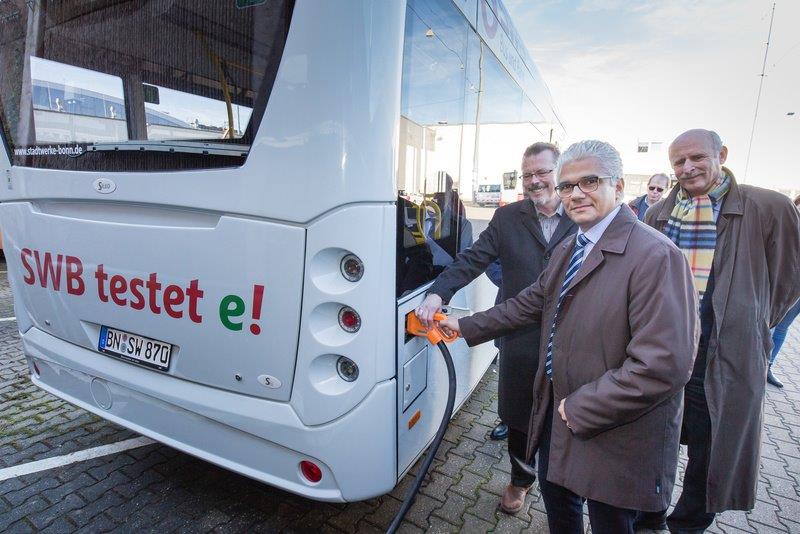
"Bonn is the headquarter of the United Nations Climate Change Secretariat so that a good signal for the local climate," said Ashok Sridharan, the Mayor of Bonn. In addition to the climate aspect, the introduction of electric vehicles corresponds with other urban policy objectives such as the Bonner Clean Air Plan and the measures on noise reduction in the city. Sridharan: "There are several arguments in favour of the use of electric vehicles. They are quiet, pollution-free and carbon-neutral, because they are driven by pure certified natural electricity of Stadtwerke Bonn. I therefore hope that the six new Bonn’s e-buses tested in the project will prove the cost-effectiveness and sustainability to further drive conversion of the bus fleet. "
Stadtwerke Bonn had been awarded the contract to participate in the project with six buses at the end of 2013. Following a Europe-wide tender for the manufacturer, Sileo, based in Salzgitter, received a contract to supply the vehicles. "We have already tested five buses of various manufacturers in Bonn in recent years and gained a lot of valuable experience. Now we have bought e-buses for the first time. We hope that they will fulfill the technical requirements and receive positive feedback from our passengers," said Heinz Jürgen Reining, Manager of SWB Verkehrs GmbH.
For years the Stadtwerke Bonn has intensively dealt with the topic of electric mobility and the use of electric buses in Bonn’s transport. In 2013, the Fraunhofer Institute for Transportation and Infrastructure Systems had confirmed in a feasibility study that according to the prior art, the entire bus network except the Bonn Airport bus is suitable for the use of electric buses and that a change of the entire bus network by about 2030 would be technically possible. In contrast to the business strategy in many other public transport companies, alternating current charging of the batteries in the route network of Bonn will be omitted.
The purchase of electric buses, however, was still hindered by the higher cost compared to conventional diesel vehicles. "With the financial support from the project ZeEUS the decision was made much easier for the purchase of electric buses," explains Heinz Jürgen Reining. "The industry now needs impulses for the production of higher volumes, thanks to which the cost per vehicle will decline significantly. As a result, transport companies and municipalities will be able to afford the conversion of their bus fleets. Funding projects like this one are very helpful, "said Reining.
The EU demonstration project ZeEUS, coordinated by the International Association of Public Transport (UITP) in Brussels, Bonn tests the electric buses next to nine other European cities: Barcelona, Cagliari, London, Münster, Paris, Pilsen, Randstad, Stockholm and Warsaw. ZeEUS gathers 40 partners, including the Fraunhofer Institute for Transportation and Infrastructure Systems. The EU funding for the project amounts to 13.5 million euros. More than 500,000 euros will go to Bonn.
The project findings will be collected until 2017 and focus on the sustainability and efficiency of electric buses in direct comparison to diesel buses, but also "soft factors", such as customer satisfaction, comfort and reliability are incorporated into the rating.
The Bonner electric bus is a 12-meter standard bus and with capacity to transport 80 passengers. Before the first line will enter service with passengers, the drivers will undergo a training on the new vehicles and the newly installed charging technology. All six buses will stay in operation in the Bonn bus network, also after the end of the project.
Data and facts about the vehicles
The buses used have the following characteristics: type Sileo S12, capacity: of 38 seats (including the driver.), 42 standing places, usable cargo capacity of the battery: 230 kW hours, range: more than 200 km. Maximum speed: 75 km/h. Electric drive: two 85 kW motors close to the tyres in the rear axle.
CO2-free drive with Bonn Naturstrom
The test vehicle is driven in Bonn with the SWB green power produced by Bonn Naturstrom. The product carries the “green power” certificate awarded by the environmental organisations and consists of 100 % renewable energy sources. The six new buses in Bonn are driven by this 100% CO2 neutral power source.
Electromobility in Bonn
The city of Bonn sees the electric mobility as a future technology. Under the necessary condition that the electricity to drive electric vehicles comes exclusively from renewable energy sources, electric mobility can make an effective contribution to climate protection. In addition, electric vehicles reduce the noise pollution and emissions. Therefore, in the city of Bonn and the urban societies electric vehicles will be integrated into the fleet increasingly. SWB energy and water operates in Bonn city area five e-charging stations and encourages the purchase of electric vehicles. In August 2012, also the city of Bonn, the Rhein-Sieg-Kreis and the energy supplier in the region have (including SWB energy and water) entered into an agreement to jointly develop projects to cover the energy demand for electric vehicles powered by green electricity from the region. Since 2012, the "Day of electric mobility" which covers all municipalities takes place annually. At this event, electric mobility is brought closer to the region’s citizens.
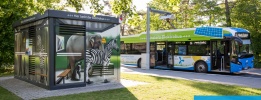

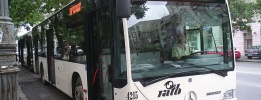

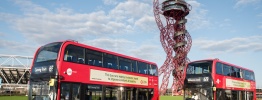
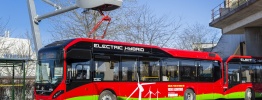
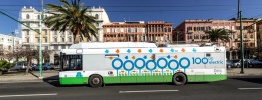
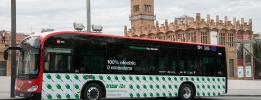
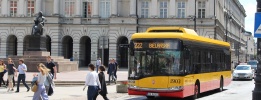
 ZeEUS is co-funded by the European Commission under the 7th Research & Innovation Framework Programme, Mobility & Transport Directorate General under grant agreement n° 605485. The ZeEUS project has been launched by the European Commission in the frame of the European Green Vehicle and Smart Cities & Communities
ZeEUS is co-funded by the European Commission under the 7th Research & Innovation Framework Programme, Mobility & Transport Directorate General under grant agreement n° 605485. The ZeEUS project has been launched by the European Commission in the frame of the European Green Vehicle and Smart Cities & Communities Coordinated by UITP
Coordinated by UITP